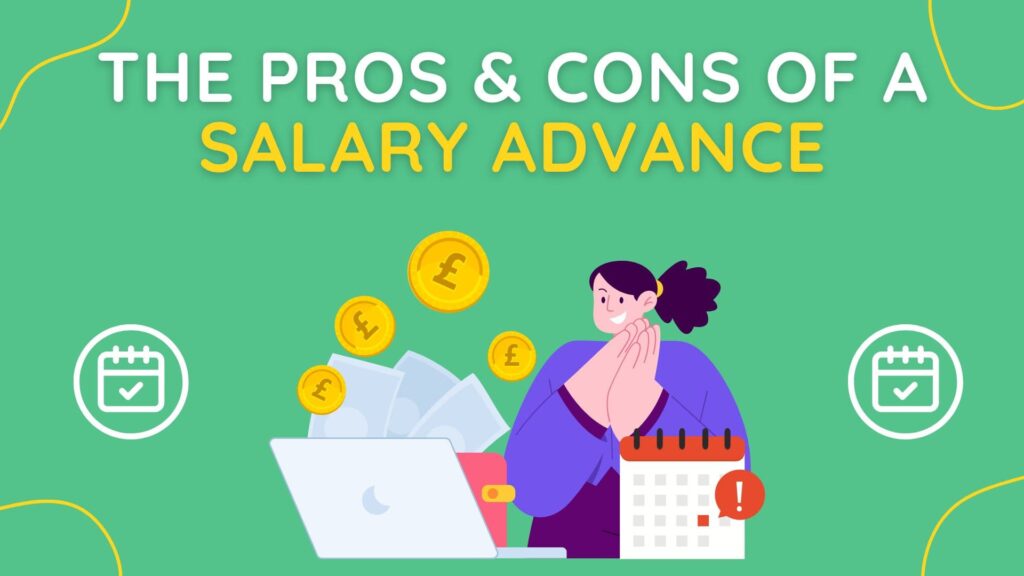
Sammie Ellard-King
I’m Sammie, a money expert and business owner passionate about helping you take control of your wallet. My mission with Up the Gains is to create a safe space to help improve your finances, cut your costs and make you feel good while doing it.

Quickfire Roundup:
You might think a salary advance is a great idea because it is easy money, but it certainly comes with some considerations!
Although it provides necessary cash in a pinch, you could become trapped in a spiral of debt.
Fortunately, there are several alternatives to a salary advance that will boost your credit score and stop you from being reliant on these advances.
Most of us have been there – when there are too many days at the end of the month and you wish you could get but don’t know the pros and cons of a salary advance.
Money is getting tight, but you still need to feed yourself, buy fertiliser for your (probably too many) indoor plants, and get a pack of treats for your pet.
Not to mention the endless bills stacking up.
Don’t worry, you are not alone. 64% of UK residents report running out of money before payday rolls around.
That brings us to the concept that we already mentioned: the salary advance. This type of salary finance is there to help you access your hard-earned cash before payday. You worked for it, why not reap the rewards early?
Read on to find out everything you need to know about payday advances, and whether they are the right financial solution for you.
Table of Contents
What Is A Salary Advance?
A salary advance is what your company pays you before payday if you have the need for it. It is not bonus money, but rather money taken from your official wage paid to you earlier in the month.
The amount of money varies depending on your needs, but generally, you can get up to 50% of your salary early.

There are exceptions, though, at the discretion of your company. If you need to put down a deposit on a new house, you can request an amount that exceeds your monthly wage, and pay it back in the form of a reduced wage for the next few months.
Earning a salary advance is not as easy as just asking (although that is a good place to start). You’ll have to discuss the prospect with your payroll manager or HR, and also provide your reasoning.
The manager will then determine if the request is valid. Odds are the company will also determine whether you are a trusted employee and consider how long you have been with the company.
Keep in mind that a salary advance is not a loan. You do not have to pay it back or pay any interest on it. It is simply your monthly wage paid at an earlier date.
In certain circumstances, your company will have a contract with a third-party provider who offers salary advance schemes.
In these instances, your company will get your advance from the salary advance scheme, and then pay it back with your next pay packet.
Despite there being no interest, you will have to pay a fee to access your salary early – but more on that later.
There are many companies that offer these schemes (also called Employer Salary Advance Schemes), however, they are generally unregulated. Despite salary advances being advertised as alternatives to payday loans, it remains a form of high-cost credit, simply via your employer.
Why Is A Salary Advance Useful?
We’ve all been in a tight spot where the money in our bank account is simply not enough to make ends meet.
In such cases, when you just can’t wait for your normal payday, a salary advance scheme can come in handy.
A salary advance forms part of your employee benefit and is a convenient and flexible way to quickly get a lump sum of cash without having to stand in those painful lines at the bank.
Not only is it great for unexpected emergencies, but they are also incredibly easy to repay since the money is simply deducted from future wages.
If you’re looking to plan ahead then think of ways you can avoid this in future as it’s not something you want to always be doing.
Think of putting together an emergency fund and consider how much you need to live comfortably without straining yourself.
The Advantages And Disadvantages Of Salary Advances

There are plenty of advantages to salary advance schemes, but there are downsides too:
Advantages
- Fast money: You can easily access money in case of an emergency.
- High approval rate: If you are a trusted employee and have a valid reason, you will probably have your advance approved.
- No credit check required: This can be a good thing if you have a low credit score (but also a bad thing – see disadvantages below).
- Automatic repayment: You repay the advance by having it deducted from your next wage.
- Minimal fees: You may have to pay a small fee, but it is minimal compared to other loans.
Disadvantages
- Not good for paying off debt: An advance on your wage is unlikely to get you out of debt, as you are not getting bonus cash, just early cash.
- It is not regulated like loans are: This means you might not get credit checked, but you also can’t complain to the Financial Ombudsman Service if things go wrong.
- No money is free money: There are still fees involved each time you want to get early access to your salary.
- The debt can be cyclical: Constantly borrowing money from your monthly salary means your future salaries will be reduced. This means by the next payday, you will have less money in your account – and you might need early access again for the following month.
- Trapped at your company: If you are stuck in a cycle of debt to your company because of wage advances, you might not be able to quit your job until you have repaid all the money.
- No credit checks: This is a disadvantage too since no one is checking whether you are living within your means and can afford to take a cut to your next pay packet.
Tips To Stop Relying On Your Salary Advance
Even if you feel there is no other way, I have some tips to help you become free from the cycle of a salary advance scheme or to stop you from taking out payday loans.
- Take control of your money: It is time to set up a budget. Set up a spreadsheet of your monthly income and expenses, and see where you can cut back or make some changes.
- Save up for emergencies: Try setting aside a few pounds each month as soon as you get paid, as much as you can afford, and access these funds only when you require cash urgently.
- Try alternative income sources: If you have the time, you can consider alternative sources of income, such as freelancing. This will prevent you from becoming dependent on a payroll scheme.
- Consider other types of loans: I will discuss alternatives in greater detail below, but consider a credit card or borrowing from family members instead.

Alternatives To A Salary Advance
Clearly, there are some significant disadvantages to a salary advance scheme, so let’s consider the alternatives:
- Credit card: Credit cards are great for one-off payments and can be incredibly useful in an emergency. If you are able to repay your credit card debt monthly, you will get a good credit score and will be able to cover emergency expenses.
- Account overdraft: If you have a regular salary deposited in your bank account, you can approach your bank and ask about increasing your overdraft.
- Family and friends: You might not want to be in debt to your loved ones, but in emergencies they might be able to help you out, free of interest. That sure beats taking out a payday loan!
Salary Advance Fees And Charges
As I mentioned earlier, there is no such thing as free money. If your company uses a 3rd party to pay your advance, you can expect this.
But most of the time your employer will do this directly and you will pay NO INTEREST.
Although you’re getting an advance on your salary, you’ll also have to pay a small fee to get this advance. So, before you request an advance, make sure you have the money available to cover the fee.
You will probably be offered a fixed cost to pay per advance, but consider comparing this fee to those of other types of loans or credit card fees to make sure it’s worth it. If you “borrow” a lot (of your own salary) for a long time period, you might end up paying more than you would have for interest rates on a loan.
Here’s an example:
Say you’re taking out a short-term loan. You borrow a mere £50 for one month with a 10% interest rate.
That means your interest will be 42p (if your annual interest rate is 10% your monthly rate will be 0.10/12=0.0083). Your fixed fee for your salary advance will be much higher.
FAQs
Who can apply for a salary advance scheme?
Your employer might have to sign up with a provider that offers an Employer Salary Advance Scheme.
However, even if your company is not signed up for this scheme, an employee can still approach HR or payroll and ask for an advance on their salary.
Are salary advances regulated by the Financial Conduct Authority?
No, salary advances are not regulated by the Financial Conduct Authority, as these are not loans and are not defined as credit under current legislation.
Final Thoughts
A salary advance can be incredibly useful if you find yourself with too many days between payday and bills that are due.
That said, these are not the answer to all your financial struggles as you can quickly become entrapped in a circle of debt.
Make a budget and stick to it to avoid needing an advance on your salary.
MORE LIKE THIS
Share on social media
Disclaimer: Content on this page is for informational purposes and does not constitute financial advice. Always do your own research before making a financially related decision.


